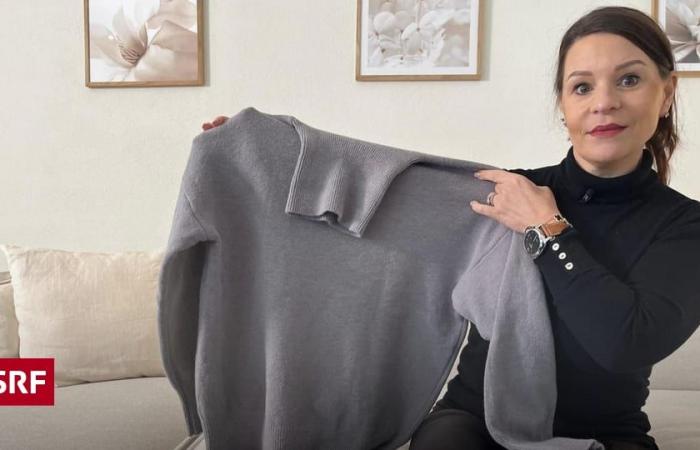Online providers pose as Swiss companies and lure customers into a trap with false promises.
Author:
Marianne Kägi
10.12.2024, 20:41
Complaints about dubious shops are increasing in “Kassenjagd”: a growing number of online providers are claiming to be Swiss companies with good quality products. But cheap Asian junk is then sent – or nothing at all.
Claudia Spörri searched the Internet for a warm turtleneck sweater for the winter. She found a seemingly attractive offer online: a cashmere sweater from a “traditional Zurich company”. The price was surprisingly low, but the website seemed credible – the imprint listed an office in Glattbrugg.
But the unpleasant surprise came weeks later. Claudia Spörri received an email saying the goods had left China. “Then I thought: Holy shit!” she remembers. Weeks later she received the package with the sweater. But that wasn’t Kashmir. According to the label, it consists of 95 percent polyester and 5 percent elastane.
Dropshipping: The business model behind fake shops
“This is a violation of the law against unfair competition; you cannot advertise a product with features that it does not have,” says Lucien Jucker from the Consumer Protection Foundation. However, there are plenty of such offers.
How to recognize fake shops
Open the box
Box zuklappen
- Lure offers:
Prices that are too good to be true often indicate fraud. - Imprint:
Missing or incomplete information is a warning signal. - Payment methods:
Pay through companies that offer buyer protection, such as PayPal or credit cards. - Domain:
Incorrect spellings or unprofessional URLs are suspicious. - Reviews:
Research reviews on independent platforms to avoid deception. - Pay attention to SSL encryption:
Pay attention to “https://” and the lock symbol – both are mandatory for secure shops. - Language and design:
Many fake shops stand out due to poor translations and an unprofessional appearance.
The business method of these shops is called dropshipping. They sell goods from Chinese trading platforms such as Ali Express. Orders would be placed directly in China; the alleged Swiss web shop is merely an intermediary without its own warehouse that offers the products in its online shop and forwards orders. “Customers pay so much for products that are much cheaper there,” says Jucker.
Every day, viewers report to “Kassen Crash” who have fallen for such companies. For example Helen Heim Huber. She has been waiting for a delivery from chiccasa.ch, or Melanie Gasser, for months: she received cheap dresses instead of the stylish evening wear advertised.
Refund is difficult
Customer Claudia Spörri wanted to return her sweater and get her money refunded. But the provider Wilhelm Wald only offered a 10 percent discount on the sweater or a voucher for the next purchase. For Claudia Spörri, this is unacceptable: “It’s just not okay!”
Wilhelmwald’s headquarters in Zurich are now abandoned. Company owner Jorge Oesterle writes to “Kassenrutsch”: “Unfortunately, products were delivered that do not correspond to the quality. The business was closed.” Defective products would be refunded. Chiccasa.ch and Stella-Zurich.com did not respond to “Kassenrutsch”’s request.
Further links
Lucien Jucker advises those affected to report such companies to the State Secretariat for Economic Affairs Seco. And: “Payments made by credit card can under certain circumstances be reversed.” But many customers are left with the damage. After all: Claudia Spörri got the money for the sweater back after “Kassenrutsch” intervened.
Swiss






